| Kungur Ice Cave | |
|---|---|
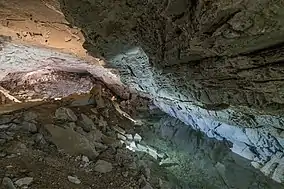 The Giant Grotto in Kungur Ice Cave | |
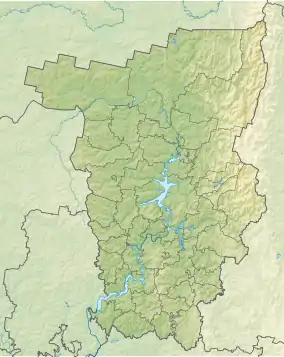 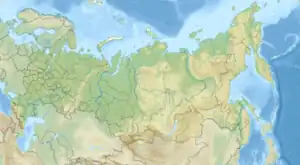 | |
| Location | Kungur, Perm Krai, Russia |
| Nearest city | Kungur |
| Coordinates | 57°26′27″N 57°00′21″E / 57.4409°N 57.0059°E |
Kungur Ice Cave is a karst cave located in the Urals, near the town Kungur in Perm Krai, Russia,[1] on the right bank of the Sylva River. The cave is noted for its ice formations and is a popular tourist landmark.
History and archaeology
Kungur Ice Cave has been known since 1703 when Peter the Great issued the decree sending a well-known geographer Semyon Remezov from Tobolsk in Kungur. He worked out the Uyezd plan and made the first sketch of the cave.
The cave has been an excursion site since 1914, and it is equipped with three tour routes of different length:
- The examination of a large excursion ring (classic route) covers 1.5 km (0.93 mi) and takes around 1 hour and 20 min
- The second is 1.8 km (1.1 mi) and takes 1 hour 40 min
- The third is the biggest, 2 km (1.2 mi) and around 1.5 hour. On this tour, there is a laser show and the route is more difficult.
One hundred thousand visitors come each year, and over five million people have been to the cave since it opened.
In the eastern part of "The Ice Mountain" there are two sites of ancient settlements from the 7th-9th centuries, relating to Lomovatov culture. Yermakov's site of ancient settlement has been known since the 19th century.
Myth and stories
Inside the cave there is a set of narrow stone steps called "the female tears". The name comes from a story, that a long time ago a foreign princess tripped and fell on them. After she returned home she got married. Since then, it is said that if a woman falls down on these steps she will get married soon.
Gallery
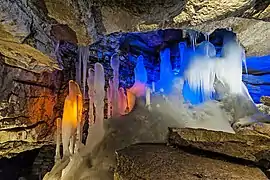 Ice formations in winter
Ice formations in winter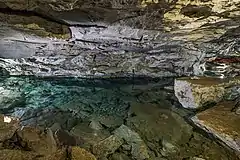 Long Grotto: underground lake
Long Grotto: underground lake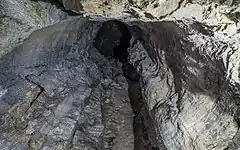 Ethereal Grotto: vertical "Organ Pipe" formation
Ethereal Grotto: vertical "Organ Pipe" formation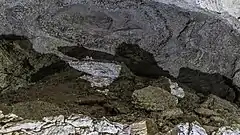 Tower Grotto: Mouse-like formation
Tower Grotto: Mouse-like formation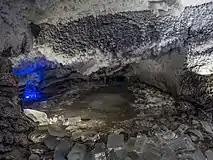 Diamond (aka Polar) Grotto: frost and icicles even during summer
Diamond (aka Polar) Grotto: frost and icicles even during summer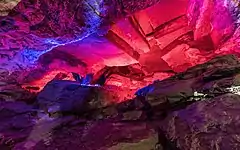 Dante Grotto: natural "ceiling blocks"
Dante Grotto: natural "ceiling blocks"
References
- ↑ "Russia.rin.ru retrieved 13th Dec 2009". Archived from the original on 2012-02-18. Retrieved 2009-12-13.